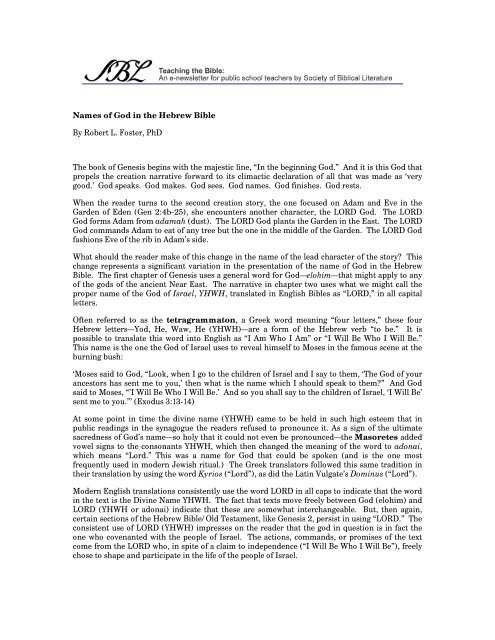Names of God in the Hebrew Bible - Society of Biblical Literature
Names of God in the Hebrew Bible - Society of Biblical Literature
Names of God in the Hebrew Bible - Society of Biblical Literature
You also want an ePaper? Increase the reach of your titles
YUMPU automatically turns print PDFs into web optimized ePapers that Google loves.
<strong>Names</strong> <strong>of</strong> <strong>God</strong> <strong>in</strong> <strong>the</strong> <strong>Hebrew</strong> <strong>Bible</strong><br />
By Robert L. Foster, PhD<br />
The book <strong>of</strong> Genesis beg<strong>in</strong>s with <strong>the</strong> majestic l<strong>in</strong>e, “In <strong>the</strong> beg<strong>in</strong>n<strong>in</strong>g <strong>God</strong>.” And it is this <strong>God</strong> that<br />
propels <strong>the</strong> creation narrative forward to its climactic declaration <strong>of</strong> all that was made as ‘very<br />
good.’ <strong>God</strong> speaks. <strong>God</strong> makes. <strong>God</strong> sees. <strong>God</strong> names. <strong>God</strong> f<strong>in</strong>ishes. <strong>God</strong> rests.<br />
When <strong>the</strong> reader turns to <strong>the</strong> second creation story, <strong>the</strong> one focused on Adam and Eve <strong>in</strong> <strong>the</strong><br />
Garden <strong>of</strong> Eden (Gen 2:4b-25), she encounters ano<strong>the</strong>r character, <strong>the</strong> LORD <strong>God</strong>. The LORD<br />
<strong>God</strong> forms Adam from adamah (dust). The LORD <strong>God</strong> plants <strong>the</strong> Garden <strong>in</strong> <strong>the</strong> East. The LORD<br />
<strong>God</strong> commands Adam to eat <strong>of</strong> any tree but <strong>the</strong> one <strong>in</strong> <strong>the</strong> middle <strong>of</strong> <strong>the</strong> Garden. The LORD <strong>God</strong><br />
fashions Eve <strong>of</strong> <strong>the</strong> rib <strong>in</strong> Adam’s side.<br />
What should <strong>the</strong> reader make <strong>of</strong> this change <strong>in</strong> <strong>the</strong> name <strong>of</strong> <strong>the</strong> lead character <strong>of</strong> <strong>the</strong> story? This<br />
change represents a significant variation <strong>in</strong> <strong>the</strong> presentation <strong>of</strong> <strong>the</strong> name <strong>of</strong> <strong>God</strong> <strong>in</strong> <strong>the</strong> <strong>Hebrew</strong><br />
<strong>Bible</strong>. The first chapter <strong>of</strong> Genesis uses a general word for <strong>God</strong>—elohim—that might apply to any<br />
<strong>of</strong> <strong>the</strong> gods <strong>of</strong> <strong>the</strong> ancient Near East. The narrative <strong>in</strong> chapter two uses what we might call <strong>the</strong><br />
proper name <strong>of</strong> <strong>the</strong> <strong>God</strong> <strong>of</strong> Israel, YHWH, translated <strong>in</strong> English <strong>Bible</strong>s as “LORD,” <strong>in</strong> all capital<br />
letters.<br />
Often referred to as <strong>the</strong> tetragrammaton, a Greek word mean<strong>in</strong>g “four letters,” <strong>the</strong>se four<br />
<strong>Hebrew</strong> letters—Yod, He, Waw, He (YHWH)—are a form <strong>of</strong> <strong>the</strong> <strong>Hebrew</strong> verb “to be.” It is<br />
possible to translate this word <strong>in</strong>to English as “I Am Who I Am” or “I Will Be Who I Will Be.”<br />
This name is <strong>the</strong> one <strong>the</strong> <strong>God</strong> <strong>of</strong> Israel uses to reveal himself to Moses <strong>in</strong> <strong>the</strong> famous scene at <strong>the</strong><br />
burn<strong>in</strong>g bush:<br />
‘Moses said to <strong>God</strong>, “Look, when I go to <strong>the</strong> children <strong>of</strong> Israel and I say to <strong>the</strong>m, ‘The <strong>God</strong> <strong>of</strong> your<br />
ancestors has sent me to you,’ <strong>the</strong>n what is <strong>the</strong> name which I should speak to <strong>the</strong>m?” And <strong>God</strong><br />
said to Moses, “’I Will Be Who I Will Be.’ And so you shall say to <strong>the</strong> children <strong>of</strong> Israel, ‘I Will Be’<br />
sent me to you.”’ (Exodus 3:13-14)<br />
At some po<strong>in</strong>t <strong>in</strong> time <strong>the</strong> div<strong>in</strong>e name (YHWH) came to be held <strong>in</strong> such high esteem that <strong>in</strong><br />
public read<strong>in</strong>gs <strong>in</strong> <strong>the</strong> synagogue <strong>the</strong> readers refused to pronounce it. As a sign <strong>of</strong> <strong>the</strong> ultimate<br />
sacredness <strong>of</strong> <strong>God</strong>’s name—so holy that it could not even be pronounced—<strong>the</strong> Masoretes added<br />
vowel signs to <strong>the</strong> consonants YHWH, which <strong>the</strong>n changed <strong>the</strong> mean<strong>in</strong>g <strong>of</strong> <strong>the</strong> word to adonai,<br />
which means “Lord.” This was a name for <strong>God</strong> that could be spoken (and is <strong>the</strong> one most<br />
frequently used <strong>in</strong> modern Jewish ritual.) The Greek translators followed this same tradition <strong>in</strong><br />
<strong>the</strong>ir translation by us<strong>in</strong>g <strong>the</strong> word Kyrios (“Lord”), as did <strong>the</strong> Lat<strong>in</strong> Vulgate’s Dom<strong>in</strong>us (“Lord”).<br />
Modern English translations consistently use <strong>the</strong> word LORD <strong>in</strong> all caps to <strong>in</strong>dicate that <strong>the</strong> word<br />
<strong>in</strong> <strong>the</strong> text is <strong>the</strong> Div<strong>in</strong>e Name YHWH. The fact that texts move freely between <strong>God</strong> (elohim) and<br />
LORD (YHWH or adonai) <strong>in</strong>dicate that <strong>the</strong>se are somewhat <strong>in</strong>terchangeable. But, <strong>the</strong>n aga<strong>in</strong>,<br />
certa<strong>in</strong> sections <strong>of</strong> <strong>the</strong> <strong>Hebrew</strong> <strong>Bible</strong>/Old Testament, like Genesis 2, persist <strong>in</strong> us<strong>in</strong>g “LORD.” The<br />
consistent use <strong>of</strong> LORD (YHWH) impresses on <strong>the</strong> reader that <strong>the</strong> god <strong>in</strong> question is <strong>in</strong> fact <strong>the</strong><br />
one who covenanted with <strong>the</strong> people <strong>of</strong> Israel. The actions, commands, or promises <strong>of</strong> <strong>the</strong> text<br />
come from <strong>the</strong> LORD who, <strong>in</strong> spite <strong>of</strong> a claim to <strong>in</strong>dependence (“I Will Be Who I Will Be”), freely<br />
chose to shape and participate <strong>in</strong> <strong>the</strong> life <strong>of</strong> <strong>the</strong> people <strong>of</strong> Israel.
Robert L. Foster is adjunct <strong>in</strong>structor <strong>in</strong> religious studies at Texas Christian University. He has<br />
authored numerous articles appear<strong>in</strong>g <strong>in</strong> such places as Journal <strong>of</strong> <strong>Biblical</strong> <strong>Literature</strong>, New<br />
Testament Studies, and <strong>Biblical</strong> Theology Bullet<strong>in</strong>.<br />
Glossary<br />
Masoretes – A group <strong>of</strong> Jewish scholars from <strong>the</strong> 6 th to <strong>the</strong> 9 th century CE devoted to <strong>the</strong> copy<br />
and preservation <strong>of</strong> <strong>the</strong> <strong>Hebrew</strong> <strong>Bible</strong>. They developed a system <strong>of</strong> mark<strong>in</strong>gs for pronunciation <strong>of</strong><br />
<strong>the</strong> text.<br />
Tetragrammaton – A Greek word mean<strong>in</strong>g “four letters” used to refer to <strong>the</strong> four consonants <strong>of</strong><br />
<strong>the</strong> Div<strong>in</strong>e Name, Y-H-W-H.

















